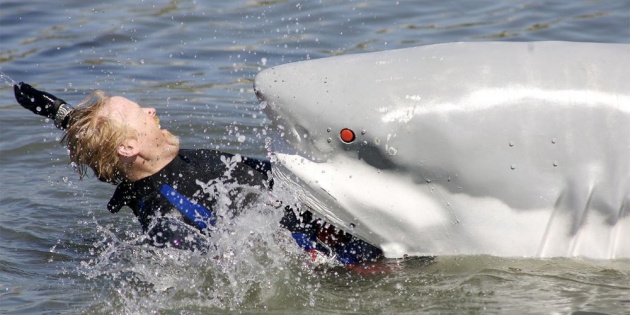
Have you ever wondered why sharks attack humans? Many researchers cite a case of mistaken identity while others believe that hypothesis oversimplifies the situation. We sat down with shark attack expert and head of the Shark Research Committee Ralph Collier to get a better understanding.
Q: Is it true that sharks mistake people for pinnipeds (seals and sea lions)?
A: That's a misconception in my opinion. As long as you have good water visibility where the shark can distinguish the object clearly, in no way do they mistake us for a pinniped.
Predatory attacks are very violent, high-energy encounters. Those types of attacks are also used when the shark perceives something as a threat.
An example: white sharks ram boats. Well, they're not ramming a boat because it look like an elephant seal or a whale, because whales don't have propellers, don't make noises and don't have people moving around in them, walking on the bottom. Whales don't do that. Plus whales don't scoot across the surfaces of the water. They undulate up and down. That's how they propel themselves and these sharks have been around for five million years. If they've made all of these mistakes they would've died out millions of years ago. They would not have been successful.
Q: Is there a good way to prevent human-shark interactions, especially for people who enjoy water sports in the ocean?
A: No. Not really. There are locations along the Pacific coast where years ago we never had any reports of sharks. And people say, "Now you get reports of sharks - that means there are more sharks out there!" Well, that might be true, but not 100%, because those same areas where we had maybe one or two surfers utilizing it 20-25 years ago, today we have 100.
So what do we have? We have more potential observers. So now if there is a shark in the area, you have 50 or 100 times as many as people as you had 20 years ago. So therefore we're getting more reports because we have more observers out there.
Q: What should someone do if they encounter a shark?
A: In the case of an encounter or if you see a shark, try to remain a calm. Usually if you see the shark there generally will not be any physical contact because the shark has simply come in to look you over.
So try to remain calm, keep the shark in sight if possible at all times, and very slowly, smoothly and calmly move to an area of safety, whether that's back to a boat or to the beach. If you're diving off an island, get back to the beach on the island. And it's always best to dive with a buddy. It's more enjoyable and it's much, much safer.
Q: What are a few basic, common-sense things we can do to prevent shark attacks?
A: I would say to bathers: don't wear bright-colored bathing suits, especially those that have contrasting colors. Some sharks can see color. Don't wear jewelry. When you're in the ocean and the jewelry moves around, and the sun reflects off of it, it could be interpreted as a fish by some of these smaller sharks and they might come in thinking it's a fish in distress.
And just use common sense. If sharks have been reported in an area, don't go in the water there. Common sense goes a long way with these animals. Never provoke a shark. So don't grab a tail. Don't try to feed them. Don't poke them with anything because you might elicit a response from them that you'll be sorry you got.
Q: Media reports claim that shark attacks around the world are on the rise. Do you think that's true?
A: Based on information that we receive at the Global Shark Attack File (which is out of Princeton, New Jersey, but we have investigators all over the planet) we're right around 100 incidents a year. Now the world population is going up every year, but yet we're still staying at about 100 a year.
When you calculate the number of what I call "contact hours" (hours that humans are in the water), if we take that times the hundreds of millions of people that use the ocean worldwide every year, to have two, three, or four fatalities... This is one of the least likely events that you can engage in where you're going to be injured by that specific animal. Nearly 3,000 people are killed every year by hippos in Africa.
I don't think there's a shark problem worldwide. The only shark problem I think we have worldwide is they're being slaughtered at unprecedented rates and it's affecting the ecosystem. And if we continue we will be very sorry as a species - not so much for losing them, but what it will do to the oceans.
Q: Do you have any advice for aspiring shark scientists or conservationists?
A: Be true to yourself and do the work because of the passion you have for it. Don't do it expecting a big reward, either financially or from a notoriety standpoint, because that isn't important. What's important is the work that goes on behind the scenes that nobody knows about, that you publish and very few people ever even learn has been done.
But all of it will eventually come full circle and hopefully help keep this group of animals, these sharks, alive. Because at the rate that they are being slaughtered, some species are off over 90% of what they should be.
And according to several world organizations, of the 60-plus pelagic species of sharks, more than a third of them they believe are on the verge of extinction. Remember that.



